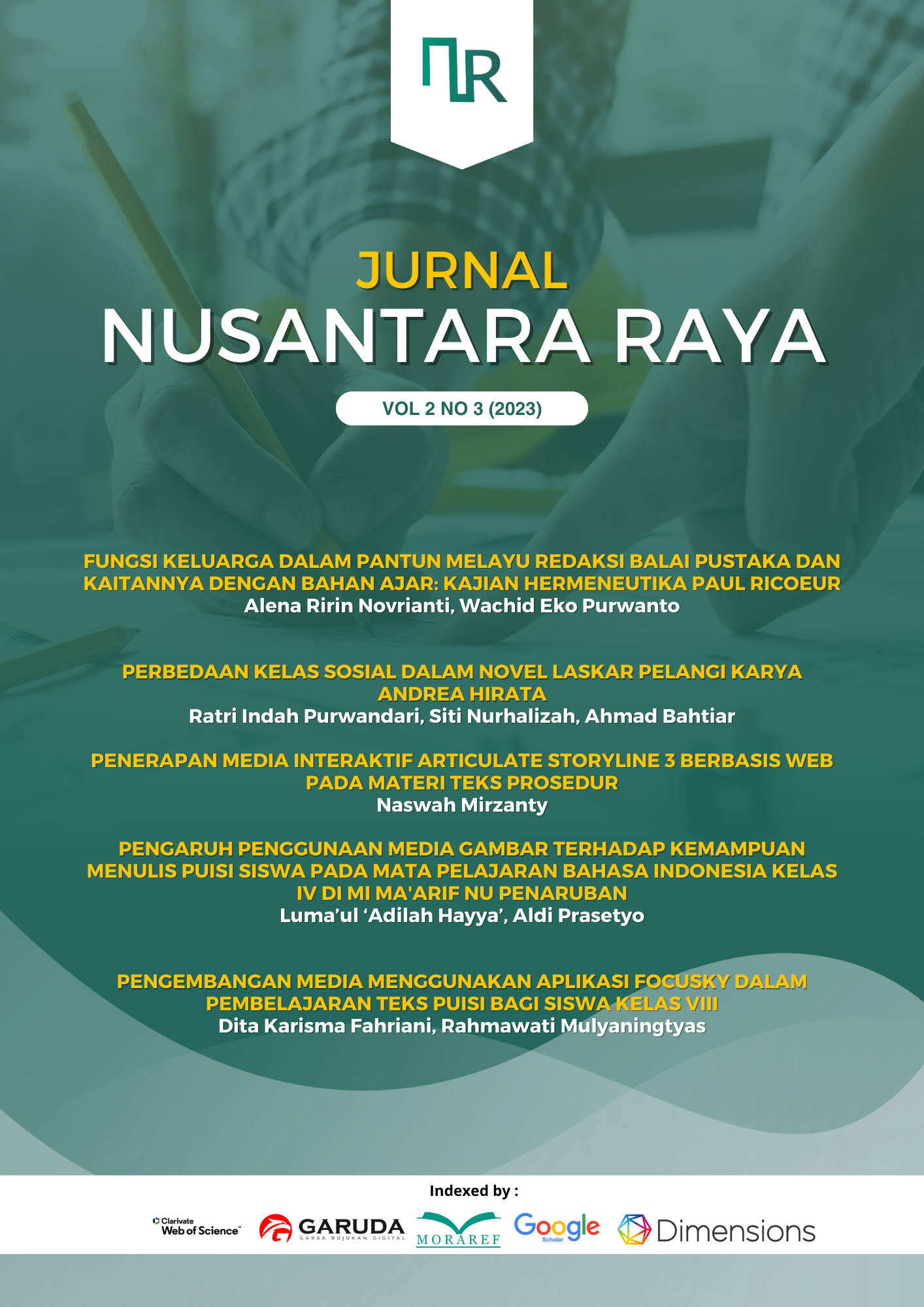MENGUATKAN MODERASI BERAGAMA SISWA BERBASIS LOCAL WISDOM DI LINGKUNGAN MADRASAH TSANAWIYAH
DOI:
https://doi.org/10.24090/jnr.v2i3.10566Keywords:
penguatan, moderasi beragama, siswa, local wisdom, madrasah tsanawiyahAbstract
This research is based on the phenomenon of intolerant attitudes that occur in students. This raises concerns from teachers, educational institutions, to the government in responding to this intolerant attitude. Meanwhile, the presence of the Decree of the Minister of Religious Affairs Number 184 of 2019 as a guideline for curriculum implementation in madrassas answered these concerns by inserting strengthening religious moderation based on local wisdom in madrasas. The results of this study show that the scheme to strengthen religious moderation based on local wisdom for students in the tsanawiyah madrasah environment is through local wisdom studies, religious education development, character building, parental involvement, student empowerment, evaluation and monitoring. This scheme can be applied in a habituation model whose implementation can be done with routine, incidental, and exemplary activities. These methods become cultural products of students, which can be used and applied in community life (empowerment). Strengthening religious moderation based on local wisdom also has an impact on students' culture of moderate reason.References
Anwar, R. N., & Muhayati, S. (2021). Upaya Membangun Sikap Moderasi Beragama Melalui Pendidikan Agama Islam Pada Mahasiswa Perguruan Tinggi Umum. Al-Tadzkiyyah: Jurnal Pendidikan Islam, 12(1), Article 1. https://doi.org/10.24042/atjpi.v12i1.7717
Faiqah, N., & Pransiska, T. (2018). Radikalisme Islam Vs Moderasi Islam: Upaya Membangun Wajah Islam Indonesia Yang Damai. Al-Fikra : Jurnal Ilmiah Keislaman, 17(1), Article 1. https://doi.org/10.24014/af.v17i1.5212
Fatorina, F., Mukhlisin, M., & Sutikno, C. (2022). Pencegahan Radikalisme Bagi Remaja Tingkat Sekolah Menengah Atas di MAN Purbalinggater. Jubaedah : Jurnal Pengabdian Dan Edukasi Sekolah (Indonesian Journal of Community Services and School Education), 2(3), Article 3. https://doi.org/10.46306/jub.v2i3.88
Fauzian, R., Ramdani, P., & Yudiyanto, M. (2021). Penguatan Moderasi Beragama Berbasis Kearifan Lokal Dalam Upaya Membentuk Sikap Moderat Siswa Madrasah. AL-WIJDÁN: Journal of Islamic Education Studies, VI(1), 1–14.
Ma`arif, M. A. (2019). Internalisasi Nilai Multikulutural Dalam Mengembangkan Sikap Toleransi ( Studi Di Di Pesantren Mahasiswa Universitas Islam Malang). Nazhruna: Jurnal Pendidikan Islam, 2(1), 164–189. https://doi.org/10.31538/nzh.v2i1.179
Miles, M. B., & Huberman, M. (1994). Qualitative Data Analysis: AnExpanded Source. SAGE Publications Ltd.
Misrawi, Z. (2013). Kesadaran multikultural dan deradikalisasi pendidikan Islam: Pengalaman Bhinneka Tunggal Ika dan Qabul al-Akhar. Jurnal Pendidikan Islam, 2(1), 197–215. https://doi.org/10.14421/jpi.2013.21.197-215
Moleong, L. J. (2018). Metode Penelitian Kualitatif. Remaja Rosda Karya.
Naharong, A. M. (2013). Terorisme atas Nama Agama. Refleksi, 13(5), Article 5. https://doi.org/10.15408/ref.v13i5.915
Naj’ma, D. B. A., & Bakri, S. (2021). Pendidikan Moderasi Beragama dalam Penguatan Wawasan Kebangsaan. Academica : Journal of Multidisciplinary Studies, 5(2), 421–434. https://doi.org/10.22515/academica.v5i2.4919
Republik Indonesia, K. A. (2017). Radikalisme Agama & Tantangan Kebangsaan. Dirjen Bimbingan Masyarakat Islam.
Yuliana, Y., Lusiana, F., Ramadhanyaty, D., Rahmawati, A., & Anwar, R. N. (2021). Moderasi Beragama Untuk Mencegah Radikalisme Pada Anak Usia Dini. Seminar Nasional Paedagoria, 1(0), 9–15.
Zuhdi, M. H. (2017). Radikalisme Agama dan Upaya Deradikalisasi Pemahaman Keagamaan. Akademika : Jurnal Pemikiran Islam, 22(1), Article 1.
Zuriah, N. (2016). Metode Penelitian Sosial dan Pendidikan. Bumi Aksara.
Downloads
Published
How to Cite
Issue
Section
License

This work is licensed under a Creative Commons Attribution-ShareAlike 4.0 International License.
Authors who publish with this journal agree to the following terms:
- Authors retain copyright and grant the journal right of first publication with the work simultaneously licensed under a Creative Commons Attribution-ShareAlike 4.0 International License that allows others to share the work with an acknowledgement of the work's authorship and initial publication in this journal.
- Authors are able to enter into separate, additional contractual arrangements for the non-exclusive distribution of the journal's published version of the work (e.g., post it to an institutional repository or publish it in a book), with an acknowledgement of its initial publication in this journal.
- Authors are permitted and encouraged to post their work online (e.g., in institutional repositories or on their website) prior to and during the submission process, as it can lead to productive exchanges, as well as earlier and greater citation of published work (See The Effect of Open Access).










